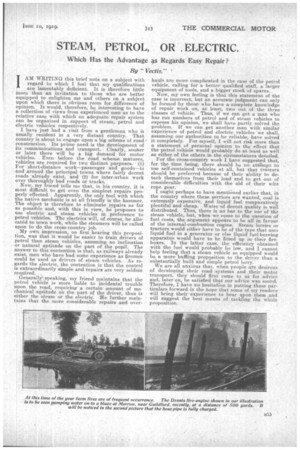STEAM, PETROL, OR . ELECTRIC.
Page 13

If you've noticed an error in this article please click here to report it so we can fix it.
Which Has the Advantage 4s Regards Easy Repair ? By " Vectis." •
IAM WRITING this brief note on a subject with regard to which I feel that my qualifications are lamentably deficient. It is therefore little snore than an invitation to those who are better equipped to enlighten me and ethers on a subject upon which there is obvious room for _difference of opinion. It would, therefore, be interesting to have a collection of views from experienced men as to the relative ease with which an adequate repair system can be organised in . support of steam, petrol and electric vehicles respectively.
I have just had a visit from a gentleman who is usually resident in a very distant country. That country is about to engage upon a big scheme of road• construction. Its prime need, is the development of its communications and lransport. Clearly, sooner or later there will be a big demand for motor vehicles. Even before the road scheme matures, vehicles are required for two distinct purposes. (1) For short-distance work—passenger and goods—in and around the principal towns where fairly decent roads 'already exist, and (2) for inter-urban work over thoroughly bad roads or tracks. Now, my friend tells vac that, in his country, it is most difficult to get even the simplest repairs properly effected. Apparently, the only tool with which the native mechanic is at all friendly is the hammer. The object is therefore to eliminate repairs as far as possible and, with this in view, he proposes to use electric and steam vehicles in preference to petrol vehicles. The electrics will, of course, be allocated to town work, while the steamers will be called upon to do the cross-country job. My own impression, on first hearing this proposition, was that it would be easier to train drivers of petrol than steam vehicles, assuming no inelinatian or natural aptitude on the part of the pupil. The answer to this contention is that, as railways already exist, men who have had sothe experience as Oremen could be used as drivers of steam vehicles. As regards the electric, the contention is that the control is extraordinarily simple and repairs are very seldom required.
Generally speaking, my friend maintains that the petrol vehicle is more liable to incidental trouble upon the road, requiring a certain amount of mechanical aptitude on the part of the driver, than is either the steam or the electric. He further maintains that the more considerable repairs and over
hauls are more complicated in the ease of the petrol vehicle, calling for a better qualified staff, a larger equipment of tools, and a bigger stock of spares.
Now, my own feeling is that this statement of the ease is incorrect, but an accurate judgment can only be formed by those who have a complete knowledge of repair work on, at least, two out of the three classes of vehicle. Thus, if we can get a man who has run numbers of petrol and of steam vehicles to express his opinion, we shall have, partly solved the problem. If we can get another man with similar experience of .petrol and electric vehicles we _shall, assuming our authorities to be reliable, have solved it completely. For myself, I will not risk more than a statement of personal opinion to. the effect that the petrol vehicle would probably do at least as well as either of the others in the circumstances detailed.
For the cross-country work I have suggested that, for the time being, there should be no attFnapt to use self-contained vehicles at all, but that tractors should be preferred because of their ability to detach themselves from their load and to get out of considerable difficulties with the aid of their wire rope gear. I ought perhaps to have mentioned earlier that, in the country where these services are wanted, coal is extremely expensive, and liquid fuel comparatively plentiful and cheap. Water aof decent quality is well distributed. Thus, there Is no bar to the use of the steam vehicle, but, when we come to the question of fuel costs, the argument appears to be all in favour of the internal-combustion engine. Steam lorries or tractors would either have to be of the type that uses liquid fuel in a generator or else liquid fuel-burning apparatus would have to be fitted up in their fireboxes. In the latter vase, the efficiency obtained with the fuel would probably be law, and I cannot help feeling that a steam vehicle so equipped would be a more baffling proposition to the driver than a substantially built and simple petrol lorry.
We are all a,nxiOus that, when people are desirous of developing their road systems and their motor transport, they should first come to us for advice and, later on be satisfied that our advice was soand. Therefore, I have no hesitation in putting these particulars forward in the hope that some of my readers' will bring their experience to bear upon them and will suggest the best means of tackling the whole proposition.
























